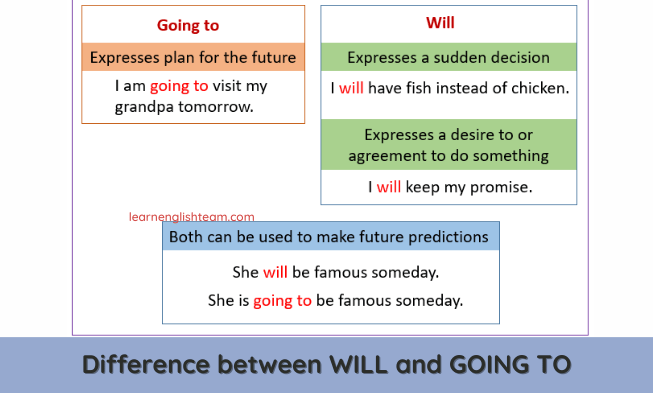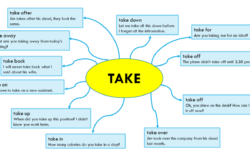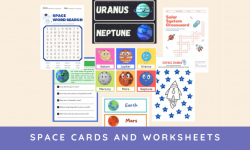Difference Between “Will” and “Going To” for Future Tense + PDF
Understanding the difference between “will” and “going to” is essential for accurate English communication, especially in formal writing.
In English, “will” and “going to” are used to talk about the future, but their usage depends on context. “Will” is typically used for spontaneous decisions, certainty, and predictions based on opinion, such as “I will call you tomorrow.” On the other hand, “going to” is used for planned actions and predictions based on evidence, like “It’s going to rain.” Mastering these differences is crucial for formal writing and clear communication. Learn more with our detailed guide and practical exercises to perfect your understanding of future tense in English.
1. Understanding “Will” and “Going To”
“Will”:
- Used for spontaneous decisions.
- Indicates a high degree of certainty.
- Commonly used in promises, offers, and predictions based on opinions or beliefs.
Examples:
- I will call you as soon as I arrive.
- We will win the match tomorrow.
- She will help you with the project.
“Going To”:
- Used for planned actions and intentions.
- Indicates prior decision or arrangement.
- Often used for predictions based on present evidence.
Examples:
- I am going to start a new job next month.
- They are going to build a new shopping mall here.
- Look at those clouds! It’s going to rain.
2. Detailed Usage and Nuances
Spontaneous Decisions
- Use “will” for decisions made at the moment of speaking.
- Example: “I’m tired. I will go to bed now.”
Planned Actions
- Use “going to” for actions that have been planned before speaking.
- Example: “I am going to visit my grandparents this weekend.”
Certainty and Predictions
- Use “will” for predictions based on personal belief or opinion.
- Example: “I believe he will succeed in his new role.”
- Use “going to” for predictions based on current evidence.
- Example: “The sky is dark. It’s going to rain.”
Promises, Offers, and Requests
- Use “will” in promises, offers, and requests.
- Example: “I will always be by your side.”
- Example: “Will you help me with this task?”
3. Practical Examples and Exercises
Exercise 1: Choose the Correct Form
Fill in the blanks with “will” or “going to”:
- She ________ finish her report by tomorrow.
- Look at those dark clouds. It ________ storm soon.
- I ________ buy a new laptop this weekend.
- He thinks it ________ be a challenging project.
Answers: 1. will / 2. is going to / 3. am going to / 4. will
4. Common Mistakes and How to Avoid Them
- Mixing Spontaneous Decisions and Planned Actions:
- Incorrect: “I will visit my friend tomorrow.” (if planned)
- Correct: “I am going to visit my friend tomorrow.”
- Using “Will” for Predictions with Evidence:
- Incorrect: “The clouds are dark. It will rain.”
- Correct: “The clouds are dark. It’s going to rain.”
- Using “Going To” for Immediate Decisions:
- Incorrect: “I am going to call him right now.” (if spontaneous)
- Correct: “I will call him right now.”
5. Advanced Usage in Formal Writing
In formal writing, the distinction between “will” and “going to” becomes more pronounced. It’s important to use each correctly to convey the right meaning and maintain clarity.
Formal Use of “Will”
- Certainty and definite future actions.
- Example: “The company will launch the new product next quarter.”
- Formal promises and commitments.
- Example: “We will ensure all guidelines are followed.”
Formal Use of “Going To”
- Planned actions and intentions.
- Example: “The committee is going to review the proposal next week.”
- Evidence-based predictions.
- Example: “Given the current trends, the economy is going to improve.”
FAQs
Q1: Can “will” and “going to” ever be used interchangeably?
A: Generally, no. “Will” is used for spontaneous decisions, while “going to” is used for planned actions and evidence-based predictions.
Q2: How can I remember the difference between “will” and “going to”?
A: Think of “will” as a quick decision made in the moment, and “going to” as a plan you made earlier or something that has clear evidence now.
Check more:
Learn 12 English Tenses with 36 Example Sentences PDF 📕
Quick and Easy Way to Learn English Verb Tenses✔️(Free PDF)
Future Tense Exercise Short Stories
Will and Going to – Future Tense PDF
“Will” and “going to” both express future actions, but “going to” refers to a plan or intention already made, while “will” is used for spontaneous decisions or to make predictions.
Will and Going to Future Tense PDF – download



